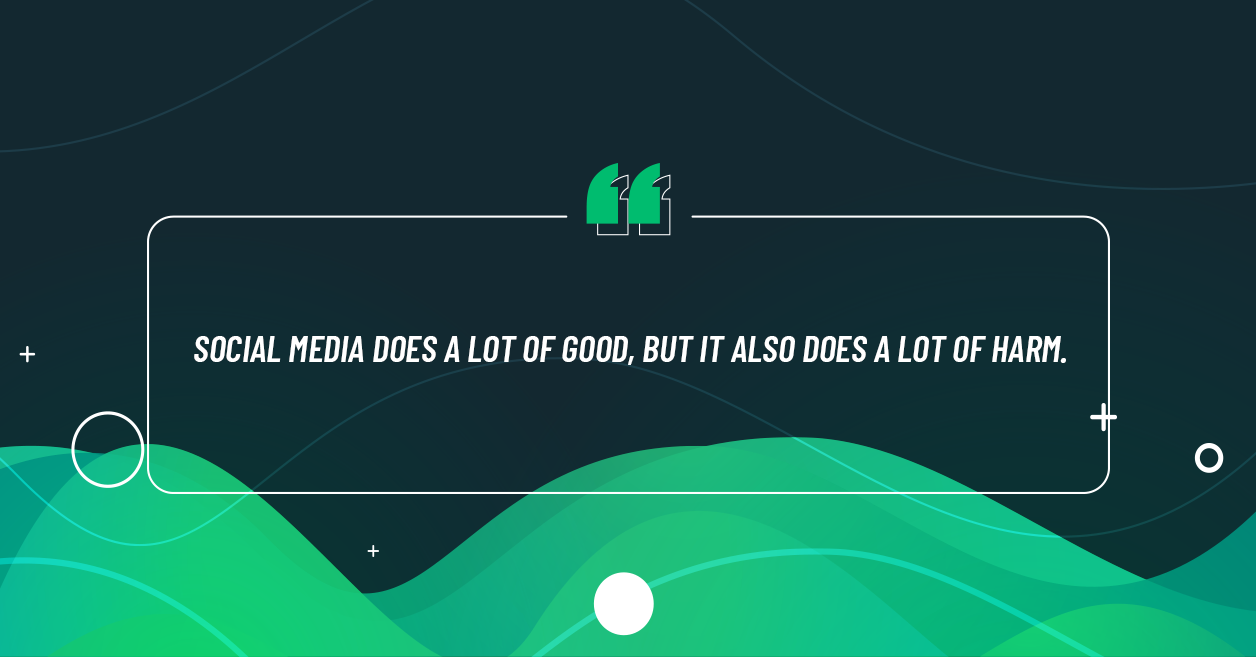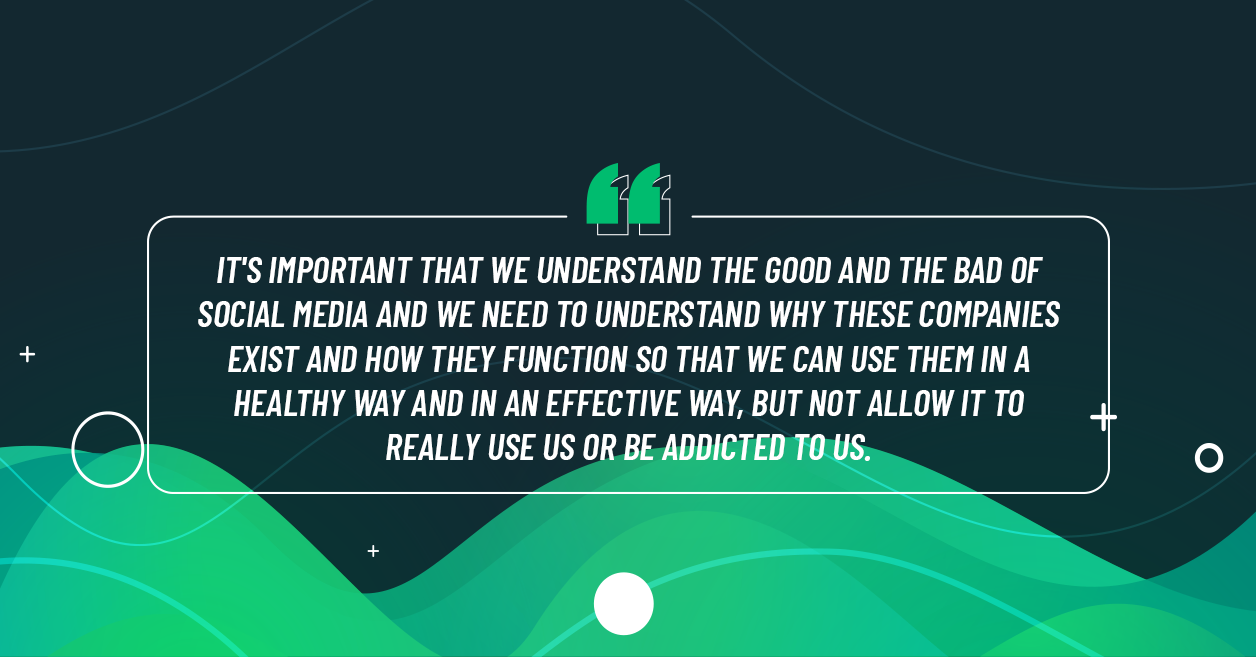My Take On The Social Dilemma
As social media platforms strive to keep our attention more and more, we need to set healthy boundaries when it comes to our social media engagement.
Have you watched The Social Dilemma on Netflix? I get that question a lot, and you've probably gotten that question. If you haven't yet watched it, I encourage you to go watch The Social Dilemma on Netflix. It's a fascinating documentary/horror film. I’m gonna talk about it, share my thoughts and what my takeaways are, and what we all need to understand after watching that.
Netflix came out with the documentary Social Dilemma, and it was fascinating. What was fascinating to me is how many people have come to me and said, did you know that social media companies function like this, or do you think it really happens like they were trying to suck us in? And the reality is they're in the business of attention, just like TV and radio historically have tried to keep our attention as long as possible so they can sell more ads. What social media is no different.
They're in the business of keeping our attention so that they can sell us more ads. That's their business model. The more addictive their product is, the more attention they have and the more ads they can sell while there isn't a person pulling strings, trying to pull us in. Essentially, artificial intelligence is doing that on their behalf and it works.

Social Media Is Addicting
The average American is spending over two hours a day on social media. And around the world, more than half the world is connected to social media, primarily on mobile devices. There are now more mobile devices than there are people in the world. And one of the most common uses of mobile devices is social media.
Social media has our attention and it's trying to keep our attention and they're doing everything they can to keep our attention. That's the bottom line that we have to understand especially now that we are in the middle of a pandemic. If you didn't understand that before, your eyes should be wide open to that reality. It's an important reality for us to wrestle with because if we're going to be engaged on social media, are we really helping create and support addictive behaviors? They say that 10% of social media users are functionally addicted to these platforms, so there's a very unhealthy side of social media and for many years, I've been just saying, look, we need to embrace social media. Social media in and of itself is not a bad thing. We just need to learn the Keys to Effectively Outsourcing Social Media.

Learn When To Draw The Line
When we look at technology, it’s used to connect people and deepen relationships. I think about all the new relationships I formed thanks to social media, I think about the family members I've been able to stay connected with because of social media. Social media does a lot of good, but it also does a lot of harm. They say that 35% of teenagers that are dealing with social anxiety have dealt with bullying on social media. There are just some significant consequences to these technologies. It's important to be fully aware but it's also important that we not just knee-jerk and abandon social media.
A lot of people watched The Social Dilemma and it was like they watched a horror film and they just kind of like, “Oh, am I just being, you know, like there are strings attached to me and I don't even realize it.” It's not as intense. It's amazing how they can use music and darkness and things to really be intense about social media. I don't think that it's this dark world where they're intentionally trying to make us addicted, because even Leaders Navigate Politics on Social Media these days. But they're just trying to keep our attention. They use all the tactics they can to keep our attention.
We've got to be aware of that and develop the habits of our personal use as to how we draw a line. At the end of the day, when I was growing up, you know, it was kind of like, are you watching too much TV? And you might be watching too much TV now. You've got to draw some healthy boundaries. If you have kids and I've got young kids, I've got to help them learn to navigate this new world of social media and develop healthy habits and learn how to deal with cyberbullying. That's a reality that's going to happen in their lifetime or deal with the self-consciousness of, “Did I get enough likes on a post?” or “Do I have enough followers?” That's a pressure that I didn't have to deal with and maybe you didn't have to deal with growing up.

My Take
But there are certain new realities and we just have to learn how to develop healthy behaviors and healthy habits and healthy infrastructures or boundaries in our life to navigate social media in a healthy way. We need to help our friends and we need to help others around us also have healthy habits when it comes to social media.
I believe the documentary was honest, but I also believe it was overdramatized. It's important that we understand the good and the bad of social media and we need to understand why these companies exist and how they function so that we can use them in a healthy way and in an effective way, but not allow it to really use us or be addicted to us. One of the famous quotes in the documentary is that if you're not the customer, you're the product. At the end of the day, our attention is the product that Facebook is selling. Our attention is the product that YouTube is selling.
As you watch a YouTube video, there is an ad probably before it and there will be an ad after it, and you're the product that YouTube is selling to that advertiser. That's a reality that we've intuitively known about TV and radio but for some reason, we didn't always make the connection when it came to YouTube.

It Matters Where You Focus
So that's my core opinion. We need to not knee-jerk and get freaked out by the documentary, but it's healthy for us all to be eyes wide open as we have awareness of the realities of social media in this new world, in this new day. We can all have healthy habits, just like we had healthy habits or worked to develop healthy habits with TV and radio and the Internet and all kinds of new innovations and technologies. It gives lots of opportunities in front of us like the Social Media Predictions Post-Covid, and it's going to be something we have to continue to learn about and develop.
Now that a lot of people's eyes are wide open, I hope that it will lead to healthier behaviors and habits. I also hope that social media companies will pay attention and help people to have healthy interactions with social media rather than feeding addictive behaviors.
So we'll see. I would love to know your thoughts as there's so much controversy around this topic, around data and all that comes with social media today and how we navigate this in our new social media world, and in this social dilemma that we live in as the product.
Got a YouTube or social media question? Text me, I'd love to help: (646) 768-9491
Related Content:
Growing Your Church With Social Media
Keys to Asking Great Questions on Social Media
Follow me on my other social media accounts!
